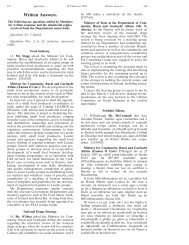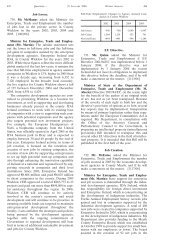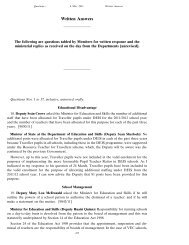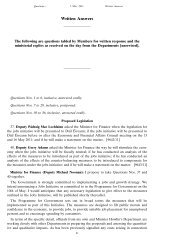Written Answers. - Parliamentary Debates - Houses of the Oireachtas
Written Answers. - Parliamentary Debates - Houses of the Oireachtas
Written Answers. - Parliamentary Debates - Houses of the Oireachtas
You also want an ePaper? Increase the reach of your titles
YUMPU automatically turns print PDFs into web optimized ePapers that Google loves.
Questions— 14 February 2012. <strong>Written</strong> <strong>Answers</strong><br />
The relevant documents are available to read at www.hea.ie.<br />
Question No. 239 answered with Question No. 190.<br />
Ministerial Correspondence<br />
240. Deputy Pat Breen asked <strong>the</strong> Minister for Education and Skills when an application will<br />
be processed in respect <strong>of</strong> a person (details supplied) in County Clare; and if he will make a<br />
statement on <strong>the</strong> matter. [8033/12]<br />
Minister for Education and Skills (Deputy Ruairí Quinn): I will arrange for a reply to issue<br />
direct to <strong>the</strong> Deputy in relation to <strong>the</strong> case that he has referred to.<br />
Literacy Levels<br />
241. Deputy Mary Mitchell O’Connor asked <strong>the</strong> Minister for Education and Skills <strong>the</strong> action<br />
being taken to address <strong>the</strong> findings <strong>of</strong> Thomas Hammerberg, Commissioner for Human Rights<br />
<strong>of</strong> <strong>the</strong> Council <strong>of</strong> Europe, who estimated on <strong>the</strong> 15 <strong>of</strong> September 2011 that 30% <strong>of</strong> Roma<br />
children in Ireland attend school and that 95% <strong>of</strong> Roma women in Ireland cannot read or write<br />
in any language; and if he will make a statement on <strong>the</strong> matter. [8144/12]<br />
Minister for Education and Skills (Deputy Ruairí Quinn): All children are entitled to preschool,<br />
primary and post-primary education, irrespective <strong>of</strong> nationality or ethnicity. All children<br />
are, in fact, required to attend from age 6-16 years. A student’s nationality is noted at primary<br />
and post-primary schools. Whe<strong>the</strong>r a student from Romania or Hungary etc. is a member <strong>of</strong><br />
<strong>the</strong> Roma community is not noted.<br />
If a student has identified educational needs, such as gaining pr<strong>of</strong>iciency in <strong>the</strong> language <strong>of</strong><br />
instruction or difficulties with literacy or numeracy, <strong>the</strong>n assistance is provided based on <strong>the</strong><br />
student’s educational needs and not on <strong>the</strong>ir cultural background. If a student has a poor<br />
attendance record, a significant amount <strong>of</strong> data is collected by <strong>the</strong> school about <strong>the</strong> student<br />
and provided to <strong>the</strong> NEWB but data on <strong>the</strong>ir ethnicity is not recorded.<br />
The Intercultural Education Strategy was launched in 2010. Amongst its ten key components<br />
are “mainstreaming <strong>of</strong> education provision” and “knowledge <strong>of</strong> <strong>the</strong> language <strong>of</strong> instruction”.<br />
English as a Second Language (ESOL) classes are provided free <strong>of</strong> charge by Vocational Education<br />
Committees (VECs) as part <strong>of</strong> adult literacy provision, based on local demand, and are<br />
open to all adults (<strong>of</strong> <strong>the</strong> 54,000 adult literacy participants in 2010, some 11,500 were ESOL<br />
participants). There have been some initiatives organised specifically for Roma women.<br />
Into <strong>the</strong> future, <strong>the</strong> approach to provision <strong>of</strong> fur<strong>the</strong>r education programmes will continue to<br />
be one that is inclusive, mainstreamed and available to all based on identified educational need,<br />
irrespective <strong>of</strong> nationality or ethnicity.<br />
Question No. 242 answered with Question No. 214.<br />
Question No. 243 answered with Question No. 190.<br />
FÁS Training Programmes<br />
244. Deputy Clare Daly asked <strong>the</strong> Minister for Education and Skills if a person (details<br />
supplied) will be eligible to complete a FÁS plumbing apprenticeship under <strong>the</strong> scheme for<br />
redundant apprentices and when <strong>the</strong> funding will be available for <strong>the</strong>m to do so. [8185/12]<br />
Minister for Education and Skills (Deputy Ruairí Quinn): The Redundant Apprentice Placement<br />
Scheme 2012 (RAPS) will provide opportunities for redundant apprentices to complete<br />
427











![[Deputy Michael Noonan.]](https://img.yumpu.com/30494839/1/190x245/deputy-michael-noonan.jpg?quality=85)




